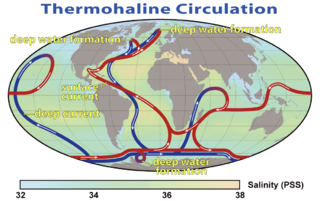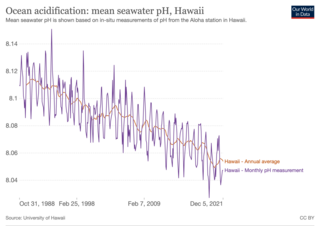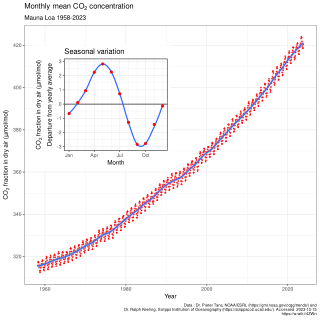
Oceanography, also known as oceanology and ocean science, is the scientific study of the oceans. It is an Earth science, which covers a wide range of topics, including ecosystem dynamics; ocean currents, waves, and geophysical fluid dynamics; plate tectonics and the geology of the sea floor; and fluxes of various chemical substances and physical properties within the ocean and across its boundaries. These diverse topics reflect multiple disciplines that oceanographers utilize to glean further knowledge of the world ocean, including astronomy, biology, chemistry, climatology, geography, geology, hydrology, meteorology and physics. Paleoceanography studies the history of the oceans in the geologic past. An oceanographer is a person who studies many matters concerned with oceans, including marine geology, physics, chemistry and biology.

There is a strong scientific consensus that the Earth is warming and that this warming is mainly caused by human activities. This consensus is supported by various studies of scientists' opinions and by position statements of scientific organizations, many of which explicitly agree with the Intergovernmental Panel on Climate Change (IPCC) synthesis reports.

Climate change affects the physical environment, ecosystems and human societies. Changes in the climate system include an overall warming trend, more extreme weather and rising sea levels. These in turn impact nature and wildlife, as well as human settlements and societies. The effects of human-caused climate change are broad and far-reaching, especially if significant climate action is not taken. The projected and observed negative impacts of climate change are sometimes referred to as the climate crisis.

Ocean acidification is the decrease in the pH of the Earth's ocean. Between 1950 and 2020, the average pH of the ocean surface fell from approximately 8.15 to 8.05. Carbon dioxide emissions from human activities are the primary cause of ocean acidification, with atmospheric carbon dioxide (CO2) levels exceeding 410 ppm (in 2020). CO2 from the atmosphere is absorbed by the oceans. This produces carbonic acid (H2CO3) which dissociates into a bicarbonate ion (HCO−3) and a hydrogen ion (H+). The presence of free hydrogen ions (H+) lowers the pH of the ocean, increasing acidity (this does not mean that seawater is acidic yet; it is still alkaline, with a pH higher than 8). Marine calcifying organisms, such as mollusks and corals, are especially vulnerable because they rely on calcium carbonate to build shells and skeletons.

Carbon sequestration is the process of storing carbon in a carbon pool. Carbon sequestration is a naturally occurring process but it can also be enhanced or achieved with technology, for example within carbon capture and storage projects. There are two main types of carbon sequestration: geologic and biologic.

In Earth's atmosphere, carbon dioxide is a trace gas that plays an integral part in the greenhouse effect, carbon cycle, photosynthesis and oceanic carbon cycle. It is one of several greenhouse gases in the atmosphere of Earth. The current global average concentration of CO2 in the atmosphere is (0.04%) 421 ppm as of May 2022. This is an increase of 50% since the start of the Industrial Revolution, up from 280 ppm during the 10,000 years prior to the mid-18th century. The increase is due to human activity. Burning fossil fuels is the main cause of these increased CO2 concentrations and also the main cause of climate change. Other large anthropogenic sources include cement production, deforestation, and biomass burning.
Kenneth Caldeira is an American atmospheric scientist. His areas of research include ocean acidification, climate effects of trees, intentional climate modification, interactions in the global carbon cycle/climate system, and sustainable energy.
Marine chemistry, also known as ocean chemistry or chemical oceanography, is influenced by plate tectonics and seafloor spreading, turbidity currents, sediments, pH levels, atmospheric constituents, metamorphic activity, and ecology. The field of chemical oceanography studies the chemistry of marine environments including the influences of different variables. Marine life has adapted to the chemistries unique to earth's oceans, and marine ecosystems are sensitive to changes in ocean chemistry.

Fisheries are affected by climate change in many ways: marine aquatic ecosystems are being affected by rising ocean temperatures, ocean acidification and ocean deoxygenation, while freshwater ecosystems are being impacted by changes in water temperature, water flow, and fish habitat loss. These effects vary in the context of each fishery. Climate change is modifying fish distributions and the productivity of marine and freshwater species. Climate change is expected to lead to significant changes in the availability and trade of fish products. The geopolitical and economic consequences will be significant, especially for the countries most dependent on the sector. The biggest decreases in maximum catch potential can be expected in the tropics, mostly in the South Pacific regions.

Climate change feedbacks are important in the understanding of global warming because feedback processes amplify or diminish the effect of each climate forcing, and so play an important part in determining the climate sensitivity and future climate state. Feedback in general is the process in which changing one quantity changes a second quantity, and the change in the second quantity in turn changes the first. Positive feedback amplifies the change in the first quantity while negative feedback reduces it.

Among the effects of climate change on oceans are an increase of ocean temperatures, more frequent marine heatwaves, ocean acidification, a rise in sea levels, sea ice decline, increased ocean stratification, reductions in oxygen levels, changes to ocean currents including a weakening of the Atlantic meridional overturning circulation. All these changes have knock-on effects which disturb marine ecosystems. The primary factor causing these changes is climate change due to human-caused emissions of greenhouse gases, such as carbon dioxide and methane. This leads inevitably to ocean warming, because the ocean is taking up most of the additional heat in the climate system. The ocean absorbs some of the extra carbon dioxide in the atmosphere and this causes the pH value of the ocean to drop. It is estimated that the ocean absorbs about 25% of all human-caused CO2 emissions.

The contributions of women in climate change have received increasing attention in the early 21st century. Feedback from women and the issues faced by women have been described as "imperative" by the United Nations and "critical" by the Population Reference Bureau. A report by the World Health Organization concluded that incorporating gender-based analysis would "provide more effective climate change mitigation and adaptation."

Justin Baker Ries is an American marine scientist, best known for his contributions to ocean acidification, carbon sequestration, and biomineralization research.

Tessa Michelle Hill is an American marine geochemist and oceanographer. She is a professor at the University of California, Davis, and a resident professor at its Bodega Marine Laboratory. She is a Fellow of the California Academy of Sciences, and in 2016 was named a Leshner Public Engagement Fellow of the American Association for the Advancement of Science. In that year she also received the US Presidential Early Career Award for Scientists and Engineers (PECASE).
Direct deep-sea carbon dioxide injection was a (now abandoned) technology proposal with the aim to remove carbon dioxide from the atmosphere by direct injection into the deep ocean and storing it there for some centuries. If carbon dioxide was to be injected to the ocean bottom, the pressures would be great enough for CO2 to be in its liquid phase. The idea behind ocean injection was to have stable, stationary pools of CO2 at the ocean floor. The ocean could potentially hold over a thousand billion tons of CO2. However, the interest in this avenue of carbon storage has much reduced since about 2001 because of concerns about the unknown impacts on marine life, high costs and concerns about its stability or permanence.

The Arctic ocean covers an area of 14,056,000 square kilometers, and supports a diverse and important socioeconomic food web of organisms, despite its average water temperature being 32 degrees Fahrenheit. Over the last three decades, the Arctic Ocean has experienced drastic changes due to climate change. One of the changes is in the acidity levels of the ocean, which have been consistently increasing at twice the rate of the Pacific and Atlantic oceans. Arctic Ocean acidification is a result of feedback from climate system mechanisms, and is having negative impacts on Arctic Ocean ecosystems and the organisms that live within them.

Human activities affect marine life and marine habitats through overfishing, habitat loss, the introduction of invasive species, ocean pollution, ocean acidification and ocean warming. These impact marine ecosystems and food webs and may result in consequences as yet unrecognised for the biodiversity and continuation of marine life forms.
Bärbel Hönisch is a German paleoceanographer and paleoclimatologist, author, and professor at Columbia University.
Climate change in the Republic of Ireland is having a range of impacts. Increasing temperatures are changing weather patterns, with increasing heatwaves, rainfall and storm events. These changes lead to ecosystem on land and in Irish waters, altering the timing of species' life cycles and changing the composition of ecosystems. Climate change is also impacting people through flooding and by increasing the risk of health issues such as skin cancers and disease spread. Climate change is considered to be the single biggest threat to Ireland according to the head of the Defence Forces of Ireland, Mark Mellett.

Ulrike Lohmann is a climate researcher and professor for atmospheric physics at the ETH Zurich. She is known for her research on aerosol particles in clouds.














